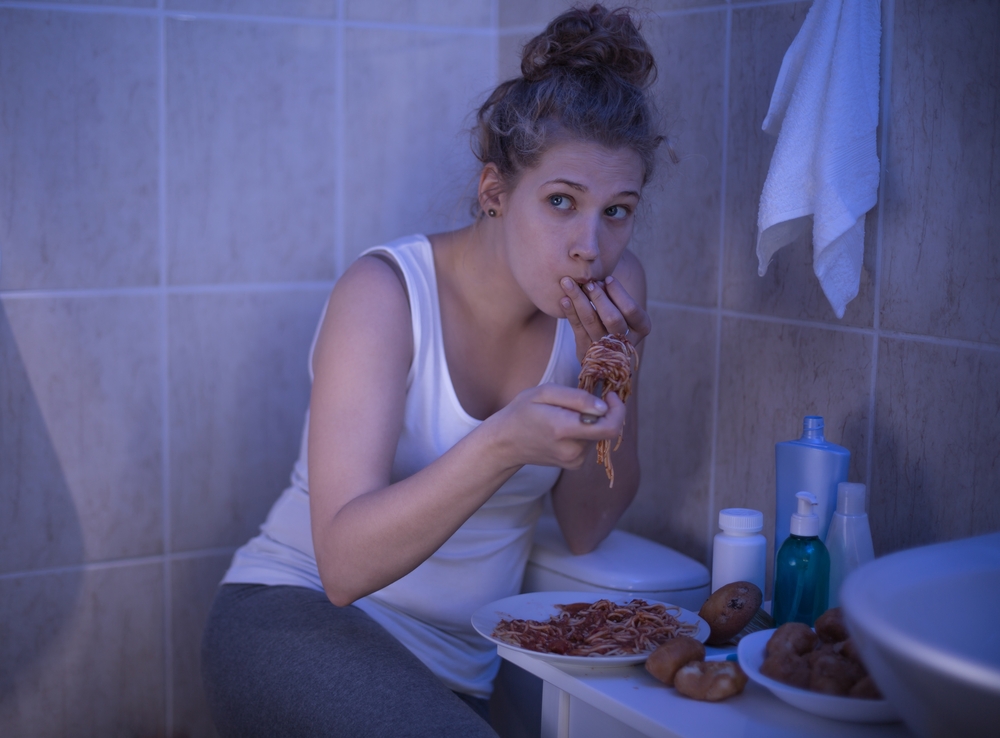Do you habitually over-indulge on certain foods or beverages? Then rest assured: you’re definitely not alone! Many of us can relate to being obsessive-compulsive ‘closet’ bingers, who secretly raid the pantry of its not-so-healthy contents, or simply eat beyond our body’s needs. For some of us this happens occasionally, while for others, mindless eating becomes the order of the day.
Whether we’re overdoing it on the potato chips or can’t seem to function without a vino at the end of the day, there is a lot of shame around the topic of ‘over-eating’ as it’s easily frowned upon as something we ought to control. It’s not quite as simple as that. More often than not, bingeing is our way of unconsciously trying to cope with a negative emotion that we don’t know how to deal with otherwise.

In order to understand this concept, and learn how to overcome binge behaviours, let me start by explaining the main triggers and reasons for over-eating.
1. First, there are the psychological triggers, such as the stresses and anxiety we experience in our daily lives. A demanding job or tension in a relationship, for example, can lead to a negative emotional response that has us running to the cookie jar in an attempt to cope.
2. A biochemical addiction to certain foods can also lead to over-eating. This is because certain foods release the feel-good hormones dopamine and serotonin, which stimulates a calming sensation in the brain and gives us a temporary buzz or high. Refined carbs are the biggies here, because they’re full of sugar and sugar is even more addictive than cocaine! So it’s easy to see why a chemical addiction to food can get us into a binge-eating cycle.
3. Our cultural environment also greatly influences our eating behaviours. If we routinely catch up with friends every week for drinks and a meal out, it can be easy to over-indulge, or our family at home may have certain food habits that aren’t conducive to good health. Many cultures also celebrate their connection through food, and get-togethers often involve ‘feast environments’ where we may feel obliged to consume rich, traditional foods so as not to offend people.
The thing is, if we learn to define the triggers for why we personally over-eat, then we can begin to reframe these behaviours accordingly and instead turn them into an healthy approach. A great way to explain this in context is by giving you a run-down of some of our TKS ladies’ top personal issues for over-eating.

• Boredom eating: If you eat because you’re bored, then you’re likely to be unfulfilled in one or more areas of your life and trying to fill the void with food. Plus you’ll probably be low in energy, lethargic and unmotivated as a result as all of the above!
My advice: Find a hobby or activity that inspires and fulfils you, something to get super jazzed about! When we are in a creative zone and focused on living our passion, we don’t think about food because it puts us in such a high vibration that we’re buzzing. Ideally, I’d recommend doing something that keeps your hands busy, such as painting, playing the guitar or exercising outdoors.
Now, if you’re a boredom eater, finding something inspiring to focus your energy on can be challenging. In that case, maybe revisit a hobby from your childhood or try something new you’ve been wanting to do but never got round to. And don’t make excuses such as “I have no time”. Creating a little bit of space even 5 minutes a day to investigate the possibility of a new inspirational pursuit will be well worth it.
• “I like the taste of certain foods”. Okay truth serum alert: Those foods don’t like you! We all like certain foods, but it is NOT a reason to over-indulge, especially when we’re consciously aware that ‘certain foods’ don’t contribute to the positive outcome we want. You have to reframe this story in your mind. “I used to like the taste of that food, but it doesn’t really resonate with me any more!” You will be amazed at how this works because the brain does what you tell it to do!
How does this work? So, a while ago I bought a cronut (one of those donut-croissant combos), to find out what the buzz was about. Admittedly this custard-stuffed morsel was amazing. Not only did it taste delicious but also contained all the sugar and fat to stimulate that temporary dopamine high! Still, I only had a couple of mouthfuls. Why? Because I have retrained my brain and you can too! I was aware of the cascade of things that could happen if I allowed myself to eat like this and fall into those habits, especially over a year (increased weight, bad skin, lack of concentration, lethargy, feeling bad about myself afterwards…).
Instead of thinking of a food that sabotages your health with ‘love’ (as something that you relate the taste of to a temporary dopamine hit to lift you out of a state of depression), rephrase it to “I love the taste of the freedom and the energy level I have” – by omitting this food. Again, it’s our inability to deal with a certain emotion that drives this kind of eating.
• Fatigue – The thinking here is “I feel tired/am exhausted after my busy day so I deserve to reward myself with food.” A lot of this stems from how we’re conditioned in childhood around being given treats as a reward for good behaviour.
Instead of actioning default behaviour (ie over-eating), it pays to sit with the emotion. I highly recommend soaking in bath with pen and paper and trying to identify the behaviour; then replacing the unhealthy food ritual with something that enhances your life. Remember, it’s not a matter of just ‘stopping’ old behaviour, but putting in a new daily action to get your place where you want to be.
With regards to fatigue, the TKS programme is the fastest way to overcoming just that, as going through the first detox phase is guaranteed to transform you energetically. Getting quality sleep is also a must. That’s when our body repairs itself – and we lose weight in the process.

• Numbing out to unwind from stressful events. Over-eating could be seen as a reward for surviving a stressful day. Again, this is when food becomes a substitute for the lack of fulfilment. Instead, if we switch into passion mode by doing something we love, even when we’re exhausted after a long day, we will have energy to burn – thriving instead of surviving.
• Emotional eating. Many people eat when they are happy, sad, anxious, depressed, angry, or all of these. As with the psychological triggers above, we get stuck in an addictive trigger-habit-reward loop. We experience the emotional trigger which activates our desire for our chosen habit, and just with the thought of eating a particular food, dopamine is released in anticipation of that food. This triggers us to seek that food ‘at all cost’. And so the reward to is the pleasure from the indulgence as we escape the emotional pain of the trigger. In other words, we avoid pain and seek pleasure. At the heart, this is addiction. The real damage however, many not be just what we do to our body, it’s the psychological aftermath of guilt and even shame that occurs when we feel like a failure, yet again.
So, to successfully overcome over-eating, it is essential that we change our vision, expectation and standards of what we want to achieve. And to change our approach from ‘should’ to ‘must’ and from wish list to action!
Begin by creating a new vision. List your reasons for that vision – that’s why the 50 Mindset reasons are pivotal to succeeding on this programme, and to living your best, healthiest life! Visualise your vision so that it’s clear what you want to create, and bring up the emotional intensity of how you would feel when living and realising it. Envision yourself emotionally free and enlightened. The more you can feel that, the more you will switch. And then look at daily habits you need to instil to create this vision.

Finally, a vision board is a great motivator and inspirational tool for changing your life around and achieving your goals. Look at images and words that inspire you in all areas of your life, including finances, relationships, social, career and health. At the centre of your vision board, put something central to your life that you want to manifest emotionally. Mine, for example, is a kids’ teepee that represents sacredness, the opportunity to go inward and create stillness.
Once things become a must-have in your life, you will find the resources to achieve the desired outcome – and that’s also the recipe for successfully beating over-eating.
Love
Deborah
Xxx



No Comments